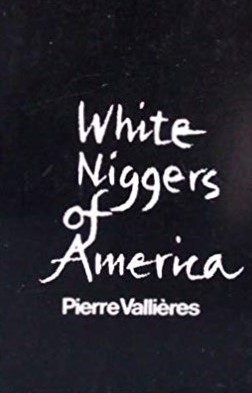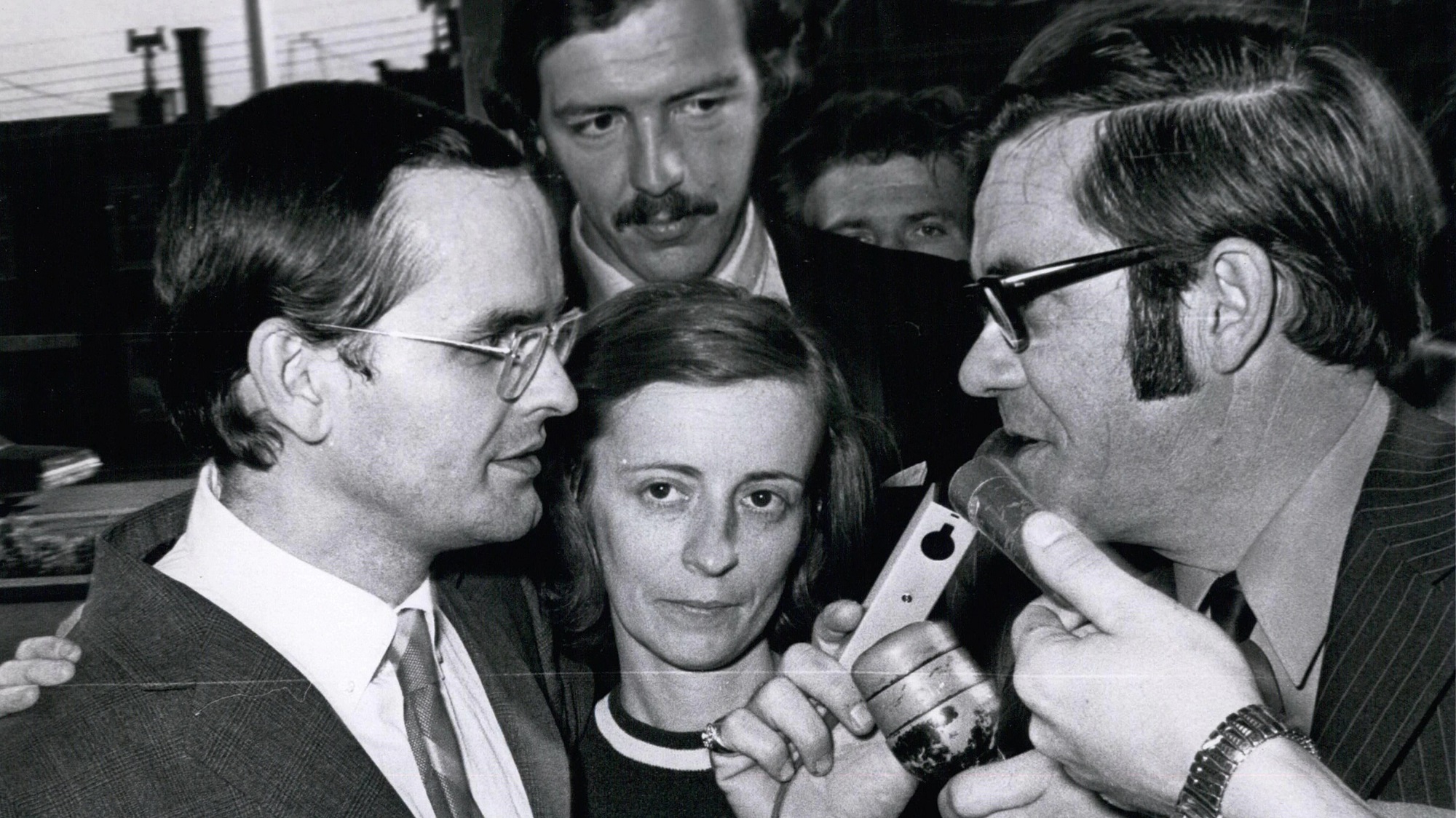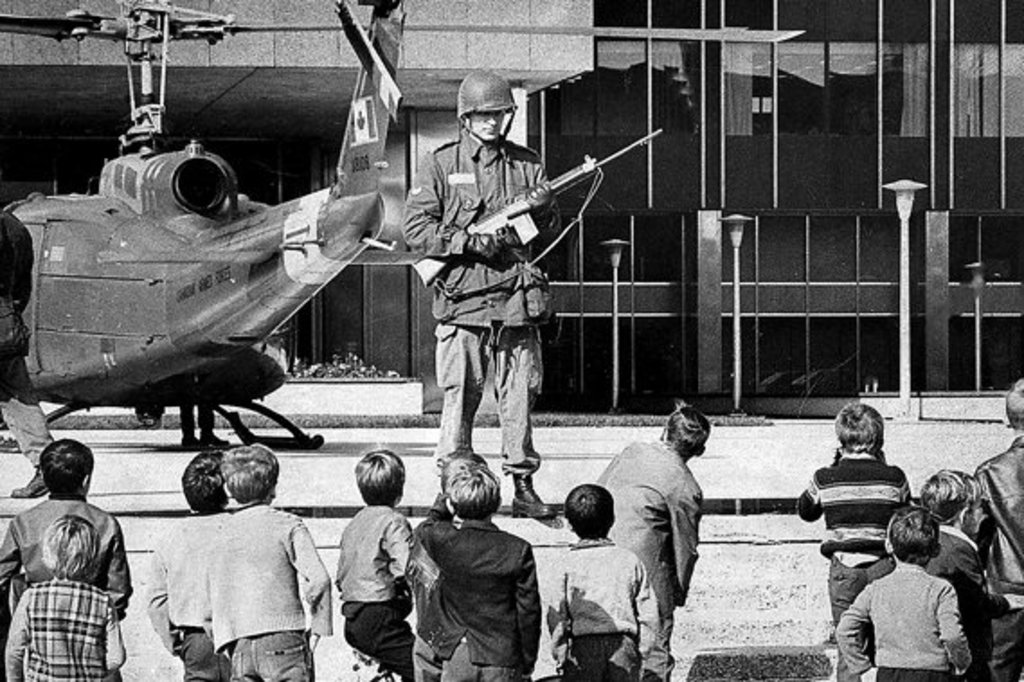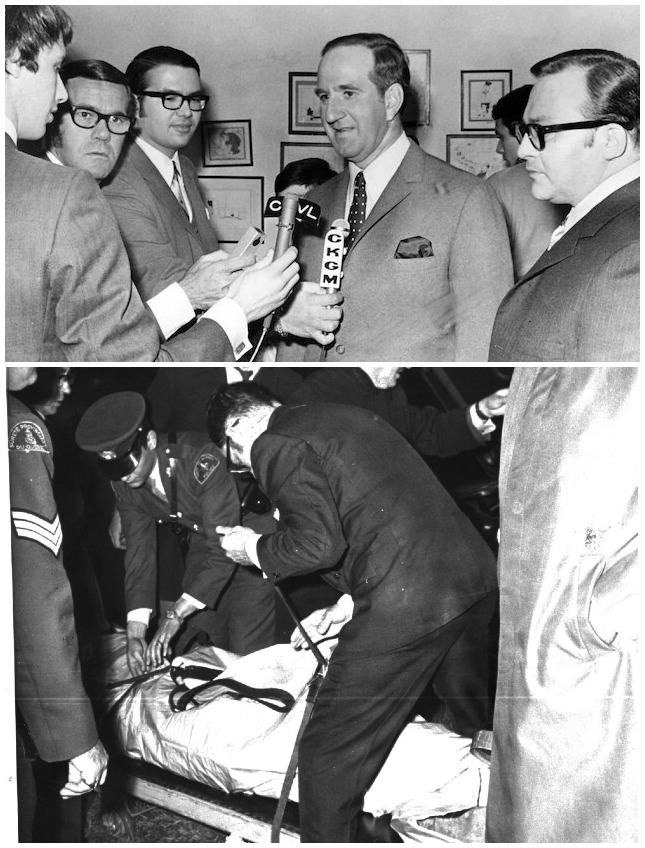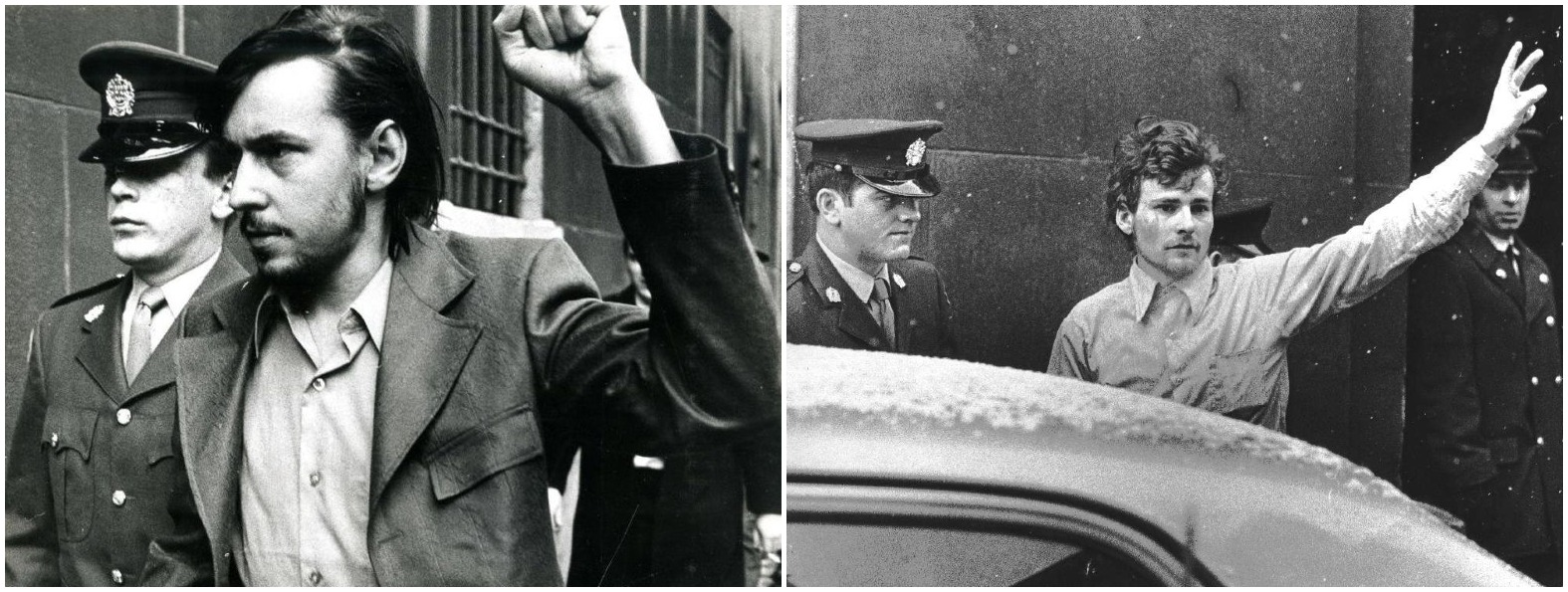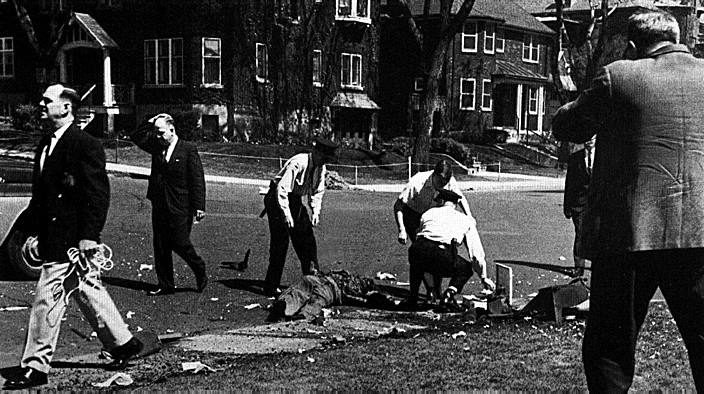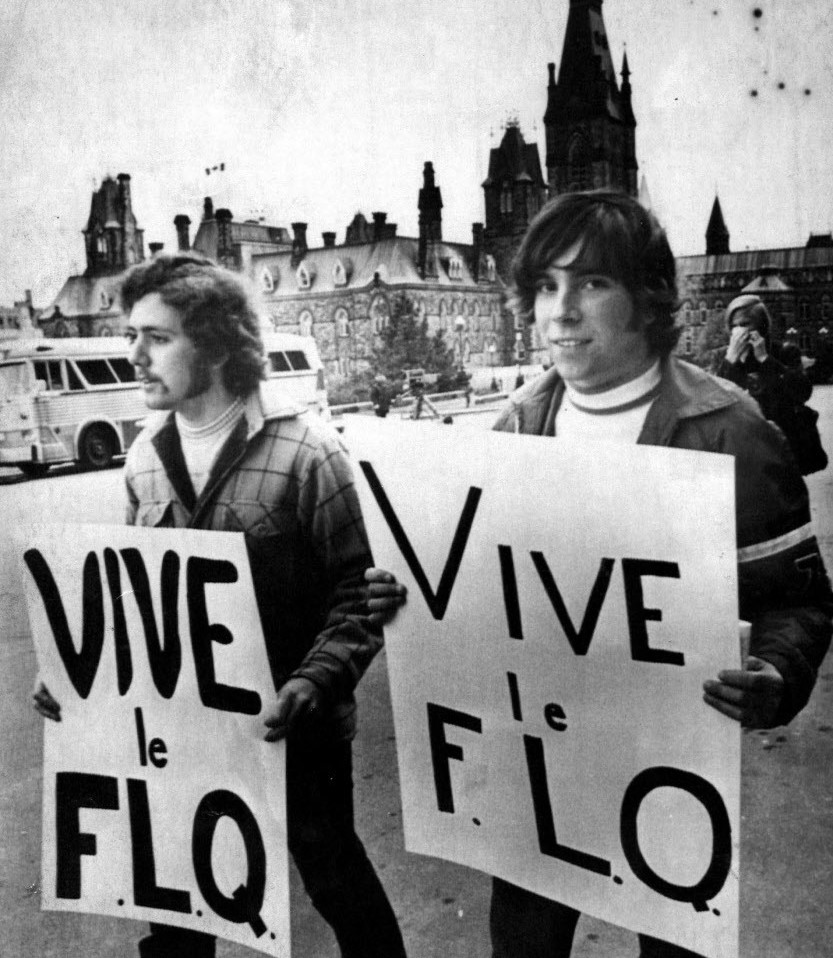All Controversial Themes
Who am I, Pierre Vallières?
The author of this book is a Quebecois, a French Canadian, a proletarian, a colonized man and a baptized son of the Church. Hence, an extremely frustrated individual for whom “freedom” is not a metaphysical question but a very concrete problem.1Pierre Vallières, White Niggers of America, trans. Joan Pinkham (Toronto: McClelland and Stewart, 1970), 13.
I am one of those political prisoners, members of the Front de liberation du Québec, on whom the establishment angrily spews its contempt and fear.2Ibid., 261.
Why I wrote this book?
In writing this book I claim to do no more than bear witness to the determination of the workers of Quebec to put an end to three centuries of exploitation, of injustices borne in silence, of sacrifices accepted in vain, of insecurity endured with resignation; to bear witness to their new and increasingly energetic determination to take control of their economic, political, and social affairs and to transform into a more just and fraternal society this country, Quebec, which is theirs, this country where they have always been the overwhelming majority of citizens and producers of the “national” wealth, yet where they have never enjoyed the economic power and the political and social freedom to which their numbers and labor entitle them. 3Ibid., 17.
It has become cliché to say that Quebec is a colony, a sub-colony, a sub-sub-colony, a triple colony, etc. The dependence of Quebec in relation to foreign countries is a constant in its history. Its economic, social, and political development, continually subordinated to foreign financial interests, has never had an independent evolution. For ever since Champlain established a trading post in Quebec in 1608, Quebec has always been subject to the interests of the dominant classes of the imperialist countries: first France, then England, and today the United States. 4Ibid., 232.
Quebec and the union of Canada
The Confederation of 1867 institutionalized the domination of business over Canadian economic, political, and social life as a whole, “coast to coast.” Today we know the real motives that guided the Fathers of the Confederation and the economic considerations hidden behind the sentimental speeches about the unity of the two “founding races” of Canada. The Canadian Confederation was nothing more than a vast financial transaction carried out by the bourgeoisie at the expense of the workers of the country, and more especially the workers of Quebec. 5Ibid., 30.
The author was writing this book as Canada was starting to celebrate the 100th anniversary of its Confederation in 1967.
The Canadian Confederation is at the point of death at the very moment when it is beginning to celebrate its centennial in an effort to believe it will survive, like a half-unconscious victim of cancer who refuses to make his will and persists in denying the death that is devouring him. 6Ibid., 44.
Why are we the “White Niggers of America”?
The true reason for the insecurity of the workers is not that their wages are inadequate, that jobs are scarce, or that they are ignorant; it is essentially that they have no control over economic and social policy. That is what the workers of Quebec have to get through their heads, as the saying goes. Because otherwise they will continue to remain for generations the “white niggers of America,” the cheap labor that the predators of industry, commerce, and high finance are so fond of, the way wolves are fond of sheep. 7Ibid., 19.
To be a “nigger” in America is to be not a man but someone’s slave. For the rich white man of Yankee America, the nigger is a sub-man. Even the poor whites consider the nigger their inferior. They say: “to work as hard as a nigger,” “to smell like a nigger,” “as dangerous as a nigger,” “as ignorant as a nigger.” Very often they do not even suspect that they too are niggers, slaves, “white niggers.” White racism hides the reality from them by giving them the opportunity to despise an inferior, to crush him mentally or to pity him. But the poor whites who despise the black man are doubly niggers, for they are victims of one more form of alienation-racism-which far from liberating them, imprisons them in a net of hate or paralyzes them in fear of one day having to confront the black man in a civil war.
In Quebec the French Canadians are not subject to this irrational racism that has done so much wrong to the workers, white and black, of the United States. They can take no credit for that, since in Quebec there is no “black problem.” The liberation struggle launched by the American blacks nevertheless arouses growing interest among the French-Canadian population, for the workers of Quebec are aware of their condition as niggers, exploited men, second-class citizens. Have they not been, ever since the establishment of New France in the seventeenth century, the servants of the imperialists, the white niggers of America? Were they not imported, like the American blacks, to serve as cheap labor in the New World? The only difference between them is the color of their skin and the continent they came from. After three centuries their condition remains the same. They still constitute a reservoir of cheap labor whom the capitalists are completely free to put to work or reduce to unemployment, as it suits their financial interests, whom they are completely free to underpay, mistreat and trample underfoot, whom they are completely free, according to law, to have clubbed down by the police and locked up by the judges “in the public interest,” when their profits seem to be in danger. 8Ibid., 21-22.
So, in summary…
A nigger’s life is not a life. And all the Québécois were (and are) niggers. 9Ibid., 138.
Between Black nationalism and French-Canadian separatism
Black nationalism-like French-Canadian separatism-is of inestimable service to revolutionaries in that it forces them to envisage the liberation of the whole man and enables them to avoid the trap of half-revolutions which, as soon as they are victorious, change into the oppression of racial, linguistic, religious, or other minorities. 10Ibid., 52.
Note: This militant movement coincided with the American movements of Black Nationalism and Black Power during the 1960s.
Towards a communist victory for the “niggers of the entire world”
[I]n this world of money, violence, and oppression, freedom and peace can be won only by the strength of numbers and of arms. They already have the numbers. The arms will come in due time . . . on the day when they are sufficiently united to constitute the invincible army of their own liberation and the liberation of the millions of men on the five continents who are now enslaved to the interests of the “free world.” For the niggers of America are one with the niggers of the entire world. One with them in servitude. One with them in the struggle for liberation. One with them, when the time comes, in the final assault on imperialism and in the definitive victory of the human over the inhuman. One with them in the revolution of man and by man, in the grand event that will sweep away all the decay of the old system and prepare all humanity, that is, all men, to begin a new history, without masters or slaves, without war or racism, without banks or thieves. 11Ibid., 53.
The necessity of violence and terror
Such a revolution cannot be accomplished without war, without violence. For the established Order will try to end to wipe it out in blood. 12Ibid., 222.
I believe that capitalist society can only be overthrown. It cannot wither away by itself, any more than the bourgeois class can commit suicide. 13Ibid., 241.
We are disgusted with 350 years of being bargained over the “indigenous” and foreign capitalists. This time we are demanding everything, independence and economic power included. And if, in order to get that, we have to confront L.B.J.’s Marines, weapons in hand, well, we will take up arms against the Marines, we will follow the example of the Vietnamese people. Then you will have no choice but to go out into the street with us and follow us…or else seek refuge, comfort, and B-52’s in Washington, as General Ky and his clique of traitors are doing. 14Ibid., 236.
Note: Nguyễn Cao Kỳ, the Prime Minister of South Vietnam, was backed by the American side during the Vietnamese conflict.
When the present system is destroyed we shall build peace together, and at the same time fraternity and justice. But in order to attain this objective, we must first build a revolutionary movement and a people’s army together. We must first organize together a violence—a force—capable of liberating us all from the multiple forms of slavery, domination, and alienation that subjugate us collectively and individually from the time we are in the cradle. 15Ibid., 270.
Violence is already taking place…
The spontaneous and increasingly fierce violence of the people, in particular of the farmers, workers, and youth, is the response called for (and obtained) by the violence that has been systematically practiced for centuries by the minority ruling classes. 16Ibid., 223.
But violence has to be organised…
Revolutionaries, on the contrary, organize the people’s violence into a conscious and independent force. 17Ibid., 224.
[S]ince the summer of 1968 there has been a great expansion of revolutionary action in Quebec. In Montreal alone there have been more than sixty bombings. In October 1968 tens of thousands of students occupied the educational institutions for several days, and the workers of the Domtar company occupied their factories, weapons in hand. Violent demonstrations have multiplied and agitation has become considerably more radical. 18Ibid., 276.
Are we, the FLQ, terrorists?
[T]he FLQ is not a terrorist movement. 19Ibid., 231.
Nonetheless the writer accepts the label “terrorist” elsewhere by quoting a journalist from Le Devoir who wrote in 1969:
All the resisters in history have been terrorists. 20Ibid., 258.
Why this separatist movement of Quebec is different from other popular ones?
I have no objection to our all getting together and telling Ottawa to go to hell. Because we have no use for its cumbersome paternalism which, by the way, costs us pretty dear in taxes and helps to confuse matters. OK. Let’s tell Ottawa to go to hell. And then? What’s going to change? We’ll have one tax return instead of two? A direct telephone line between Quebec and Washington? A comic-opera army integrated with NORAD? A delegate to the UN, another to the OAS, a third to NATO, and our very own ambassador to the Vatican? And then what? The iron of the North Shore, and the asbestos of Asbestos, the mines of Abitibi, our forests and hydraulic resources, our commerce, finance, and industry—and the political machines: will not all that still be the exclusive property of the Americans? Then what does the majority of the population of Quebec stand to gain from this paper independence, apart from one more political alienation and, probably, a still greater measure of economic servitude?
Understand me: I am not against the independence of Quebec but against the illusory independence of Quebec which, dressed up in various guises (from an Associated State to a Republic), is now being proposed to us by the parasitic petty bourgeoisie of French Canada. And that is why I am for revolution, because only a revolution in depth can make us independent. That is not a question of ideology but of fact…And one must voluntarily close one’s eyes and one’s mind to pretend not to recognize it. 21Ibid., 235.
What exactly is our communist dream?
We want to replace [our economic system] with a society in which the producers (the workers) collectively own and administer their means of production and create, organize, and plan their relations of production and the distribution of their products in accordance with ultimate goals that they choose themselves, for the satisfaction of their true needs, in the framework of an absolute equality of rights, opportunities, and benefits. 22Ibid., 237.
This revolution that Quebec needs—as do all the countries that are enslaved by capitalism and colonial imperialism—implies nothing more nor less than the disappearance of capitalism itself. That means transformations that are even more profound than those required by the nationalization of foreign capital. It is a question, in fact, of abolishing capital itself, the basis of present society. 23Ibid., 236.
A society without classes, therefore, and as soon as possible without a state. 24Ibid., 237.
A response to those who mock the communist dream as “utopian”:
More than a century earlier, Karl Marx, had declared that his theories are grounded in reality and that they’re the antithesis to the work of the socialist utopians who preceded him. He categorically rejected the label of “utopia.” However, it never went away. In fact with bloody conflicts around the world under the banner of Marxism throughout the 20th century, that label, as mockery, kept re-emerging. Curiously, Vallières here embraces the term, rather than brush it away.
And in the beginning, your utopia makes some people pity you, others ridicule you, and the majority look upon you as a kind of mystic without God! It is not long before you have acquired a reputation for being a dreamer — a fellow who is “sincere” but “idealistic.” If, on top of that, you intend to go on to action, then you become ipso facto a “communist,” an “anarchist,” an irresponsible and dangerous man who, in the interest of society, should be locked up as soon as possible in a prison or insane asylum. As long as you only preach your utopia, the established order is content to take note of your “dissent” with contempt or indifference. But as soon as you begin to act, the old system hastens to turn you into a public menace and a criminal, so as to be able to bury you alive before your “idealism” puts Molotov cocktails, dynamite, and rifles into the hands of the workers and the young people, who are very receptive to the idea of Utopia, which is all they are waiting for to rise up en masse against those who organize, profit from, and defend oppression. For no matter what the ideologists of capitalism, neocapitalism, and imperialism may say about Utopia, it is not a philosopher’s utopia: it sums up aspirations which cry out not only to be perceived and understood, but above all to be realized. Nor is Utopia the final point, the terminus of human evolution. On the contrary. It is only the point of departure, the beginning, the first stage of the new history which men will embark upon together once they are liberated from their present condition as niggers, as sub-men. 25Ibid., 60.
In short, a “utopia” is necessary for the emergence of class consciousness and collective revolutionary action. But this “utopia” is not a divine revelation but the material and theoretical product of human needs felt by men, one of whose most fundamental characteristics is the hope, the will for “more,” for progress, for an ever greater measure of freedom, happiness, creativity, and joy. 26Ibid., 252.
The romantic communist desire of fighting and “liberating” other peoples
We are not the only ones who are struggling to win our freedom! Far from it! Our struggle is linked to the many peoples’ wars that are developing in the four corners of the world against the common enemy: American imperialism. Our battles—the battles of the Québécois, the French-speaking people of America, the white niggers—interest the other oppressed peoples as their battles interest us and concern us directly. We are all interdependent and responsible for each other. 27Ibid., 270.
I am completely reconciled with my country, Quebec, which in former days I thought of fleeing and forgetting. But like Guevara, I would not hesitate to go and fight imperialism in another country if some day the “great darkness” once more descended upon Quebec and made all action impossible. But the situation in Quebec would have to be truly hopeless.
I am 100 percent Québécois, and it is in Quebec first that I want to pursue the struggle against imperialism. It is in Quebec that I hope with all my heart to overcome tyranny with my comrades, or else to die with them, weapons in hand.
If I were a citizen of the United States, it is in the United States that I would fight first. Revolution is not impossible anywhere. It is necessary in all countries, including today most of the so-called socialist countries.
It does not matter what country is our “native land.” It does not matter what difficulties we are daily confronted with: our duty as revolutionaries, wherever we may be, is to make the revolution, as Guevara so well reminded us before he was vilely assassinated by the CIA in Bolivia. 28Ibid., 278.
Note: Che Guevara was idolized immediately after his death at the hands of Bolivian forces, supported by the CIA. The dream of liberating other “comrades” overseas is not unique to Guevara, who was Argentinian and died in Bolivia. The Spanish Civil War (1936 – 1939) attracted communists from other nations. Ideology-driven fighters could always be seen joining conflict abroad. A recent example is foreign Islamists on the frontlines of the Syrian Civil War.
Should we believe in the communist vision?
A man accustomed to humiliation and forced labor (labor in order to subsist) becomes fatalistic, passive, skeptical. He is tempted to say to himself: “All those dreams only make us even more unhappy and don’t change anything. And then, isn’t it in the ‘order’ of things that there should be some people more intelligent than others, more hard working, more thrifty, less given to drink, less lazy, who succeed more easily because they are more ‘capable,’ soberer, better educated . . . richer too, you have to admit?” 29Ibid., 53-54.
I cannot “live my life” without working to make the revolution, and it seems to me that it is pretty much the same for you. It is not a question of playing at being heroes—besides, who can do that, in the era of the atomic bomb and the agonizing war in Vietnam?—but of getting together to build a new world in which ordinary men, like you and me, will no longer be the niggers of the millionaires, the warmongers, and the preachers of passivity, but will be free at last to subject the world to their “whims”: love, scientific curiosity, creation… in solidarity and equality, in modesty and pride. 30Ibid., 254.
As Marx and Engels once preached, class consciousness precedes revolutionary action
Class consciousness is developing despite the long history of senseless hatreds that has so weakened the movement for workers’ demands in America in the last thirty years. It is a slow process, but little by little racism is giving way to solidarity. 31Ibid., 51.
The consciousness of injustice exalted to a system calls for revolutionary action, for radical changes in the relations of production and property and in social relations in general. But this action cannot spring automatically out of mere awareness of injustice. It must be organized—intellectually, morally, politically, and militarily—into a really revolutionary force. 32Ibid., 221.
How Vallières, and most communists of his era, viewed the Soviet Union?
I was more impressed by the thought of Mao Tse-tung and the ideas of Guevara than by the work of Lenin. It must be said that the unfortunate evolution of the Soviet Union, of the International, and of Western Communism obliges us to question several of Lenin’s theses, for I do not think we should consider Stalin alone responsible for it. 33Ibid., 214.
Perhaps the writer could not have come up with a greater insult to the Russian Revolution than the one in the next line:
[A]fter fifty years of Soviet history, it appears that out of the popular insurrections of 1917 the Russians have made a bourgeois revolution. 34Ibid., 240.
[T]he USSR may become the number one imperialist power of the year 1980, and the Brezhnev-Kosygin clique the Rockefellers of the year 2000! 35Ibid., 239.
Vallières downplays the horrors and failures of other revolutions:
[T]he Russian, Chinese, Vietnamese, and Cuban revolutions […] are still only first, stumbling steps.36Ibid., 60.
How the writer felt about Montreal, his hometown and the most populous city of Quebec
[H]ow it is that there are so many taverns in Montreal and so many drunkards inside? Can you explain to me why you meet mostly workers there, “ignorant” men and the unemployed? And why there are more of these taverns in the French East than in the English West? 37Ibid., 54.
He described Montreal as…
[T]he city of boredom and stupidity 38Ibid., 146.
Montreal could be considered to this day the most bilingual city, in terms of French/English, in the world. The large English language representation of its residents, especially in business, sometimes creates friction with French speakers.
[I]n the next few months the quarrels over language in Montreal might well lead to street fighting. 39Ibid., 276.
The problem with the working-class family
The terrible thing about the working-class family is the function, imposed on it by the present system of renewing and perpetuating the supply of slaves, of niggers, of cheap labor to be exploited, alienated and oppressed. And the inhuman thing about a working-class childhood is the child’s powerlessness to resist the conditioning not only of the system itself but of all the frustrations of the life around him, frustrations that are generated by the capitalist organization of society and that contaminate him even before he becomes aware of their existence. 40Ibid., 85.
The role of the Catholic Church
God, if he exists, is surely not “on our side,” on the side of the majority of the human race; he is surely not on the side of the people…but rather in the very midst of the napalm the Americans are showering down upon innocent, “free” Vietnam…Let us not forget that God is an invention of the dynasties, of the aristocrats of the five continents. This invention began to haunt the minds of men from the moment there appeared on earth the first tribal chief who needed to create a “divine right” in order to preserve his rank, privileges, and power. How many men have been massacred, how many peoples crushed, in the name of the Lord God of the Christians, the Moslems, the Hindus, and the Buddhists! As you read these lines, the God of Paul VI and Lyndon B. Johnson is flying over Asia, Africa, Europe, and the two Americas in a B-52. God of the atomic age, God who fights relentlessly to vanquish Communism on earth, with his apostles, the Marines! It is no longer as it was in the time of Jesus Christ, when the first disciples gave their goods to the poor and Christ himself drove out the exploiters with a whip! 41Ibid., 155-156.
“Blessed are the poor, for theirs is the kingdom of Heaven.” The religion of degradation, of the vicious circle, of unremitting sacrifice and resignation to misfortune became “The Imitation of Jesus Christ.”42Ibid., 34.
Let us kill Saint John the Baptist! Let us burn the papier-mâché traditions with which they have tried to build a myth around our slavery. Let us learn the pride of being men. Let us vigorously declare our independence. And with our hardy freedom, let us crush the sympathetic or contemptuous paternalism of the politicians, the daddy-bosses and the preachers of defeat and submission. 43Ibid., 20.
Translator’s note: John the Baptist is the patron saint of French Canada, and in the folklore Jean-Baptiste is the old, traditional first name for a French Canadian. In many cities and villages there is a parade every year on his feast day, June 24. In the 1969 parade in Montreal, demonstrators tore the papier-mâché figure of St. John from its pedestal and hacked it up.
Only priests imagine that love can adapt itself to misery, to a stupefying daily routine, to crass ignorance of the laws and beauties of sexuality, to Jansenism and the dictatorship of capitalism. Only priests can see a kind of paradise in the proletarian hell; and how useful they are then, without knowing it, to capitalism! 44Ibid., 84.
It’s a wonder the Holy Virgin did not appear to some child, the way she did in Portugal, to entreat us to obey those who were carrying on the work of the schizophrenic Bishop Laval who, in the seventeenth century, had laid the foundations of the madhouse we were living in. 45Ibid., 41.
To be sure, the churches are still filled with the faithful on Sundays, and most people believe in God. But the Quebecois are disgusted with the comfortable priests who lead the lives of millionaires in their richly furnished presbyteries and drink Scotch on the money of the poor. As for the young people, not only are they anti-clerical, but the majority of them refuse to go to church on Sunday to watch the empty and incomprehensible rituals of another age and to pay for the show besides, if only so much as 25 cents. Do they believe in God, in Jesus Christ, in Mohammed or Buddha? I don’t know. But I have the impression that they believe first of all in themselves and in humanity, and that, unlike their parents, they are not prepared to sacrifice their earthly life for a hypothetical celestial happiness. 46Ibid., 43.
Deep inside, I despised this life in which individual personal wills were equal to the extent that those wills wanted nothing, as Engels has so rightly put it, but simply obeyed, like sheep that graze without asking questions, because God has willed it so. That is the practical freedom of those who have been touched by God’s “grace”: the freedom to graze without complaining. Fortunately, God spares an increasing number of Québécois from his “grace.” That is why Quebec has ceased to be quiet colony of Washington and the Vatican. God and his Heaven are dying in the minds of the Québécois. Mindless obedience and sanctified servitude have ceased to be “virtues.” They are becoming what they have always been: meaningless phrases, chains that must be broken. The political and economic decolonization of Quebec will be accompanied by the de-alienation of the Québécois. The Church will not make so much money, but the people will be free. 47Ibid., 172.
The Church is the witch of God, and I hope the Québécois of the future will learn to get along without her, just as children today have stopped believing in the boogie-man and taken an interest in the real adventures of the astronauts instead. 48Ibid., 176.
Regarding the Catholic reforms of the Second Vatican Council (1962–1965)
The councils reminds me of the parliamentary debates conducted by the so-called representatives of the people: they always end up ratifying little “deals” cunningly worked out for the purpose of “making people believe” that progress is being made, but they never propose radical changes. What will the people gain by praying in French rather than in Latin? Will that reduce the tithe? Will it increase the number of jobs and lower the cost of living? Will it make any change in the daily oppression?
Note: Second Vatican Council initiated some changes which were radical at the time, most of which were aimed at bringing the clergy and church services into the modern world, and closer to the common people. For example, mass was allowed to be in the local language, rather than Latin.
Making over the face of the Church, like making over the face of the capitalist system, modifies its nature only very superficially! A witch who undergoes plastic surgery to get rid of her warts and her crooked nose still remains a witch. 49Ibid.
The moment he scornfully rejected religion
Vallières had a religious phase which lasted for one year and ended with him revolting against the message of Christian love. A bizarre blasphemous curse was how he affirmed his rejection (Masturbez-vous, Seingeur):
“Fuck that kind of love,” an American would say. “Fuck that” indeed! And long live poor little human freedom! “Masturbate, Lord, and be crucified again, if you have such a passion for it! But for pity’s sake, get the hell out as fast as you can!” That was the theme of my prayers […] 50Ibid., 173.
Vive la révolution !
It’s damn well time we took our responsibilities and stopped making our revolutions in taverns and started making them in our factories. I can’t wait for the day when one of our boys, a longshoreman, say . . . or a lumberjack, yes, a lumberjack, a big strapping fellow, stands up in front of us, thousands of workers assembled in Lafontaine Park, and strikes up the Marseillaise or the Chant des partisans-because we don’t have any songs like that yet in these parts-and then this lumberjack shouts to us: ‘Aux armes, Quebecois!’ And all together, like one man, we repeat: ‘Aux armes, Quebecois!’ And then we get out our rifles and grenades and decide to make an end of … But that great day, it won’t be tomorrow. We’ll have to rouse the men. If we can get rid of the moss-backs and the ass-lickers, that will help. Those idiots are worse than the bosses. 51Ibid., 55-56.
Let us not wait for a Messiah to bring us a magical solution to our problems. Let us reflect, let us sharpen our tools, roll up our sleeves and all together set to work! The revolution is our affair, the affair of the niggers. Let us not wait to get started on it until the Pope or the President of the United States gives us the word. The word can come only from us, the niggers: white, black, yellow…the men with dirty hands! 52Ibid., 279-280.
The sooner we who are niggers arm ourselves with courage and rifles, the sooner our liberation from slavery will make us equal and fraternal men. Utopia?
It is because I cannot bear to be a nigger that I joined the FLQ; that I will stay in the FLQ until the victory of the white niggers of Quebec over capitalism and imperialism.
[…]
The Quebec revolution will not stop.We are not the only ones who are fighting. Our struggle is part of man’s long march toward liberation from the exploitation of some by others.
[…]
Hey, Georges! What are you waiting for to make up your mind? And the rest of you, Arthur, Louis, Jules, Ernest? On your feet, lads, and all together: to work! We’ll have another glass of beer when we’ve done something besides talking and always putting the blame on other people. Each of us has his little share of responsibility to assume and to turn into action. The sooner we are united, lads, the sooner we will win. We have already wasted too much time in vain recriminations,. Now we must go on to action. 53Ibid., 281.
Long live free Quebec!
Long live the revolution!
Long live the FLQ! 54Ibid., 271.
Note: All the above controversial passages are available in the original language (French) on this page.
You might also like:

Timeline of Quebec separatist movement
A brief historical outline of Quebec’s attempts at independence
BOOK: WHITE NIGGERS OF AMERICA

How Karl Marx inspired a French-Canadian terrorist
Seven communist ideas in White Niggers of America (1968) could be traced to the writings of Karl Marx
BOOK: WHITE NIGGERS OF AMERICA
Endnotes

